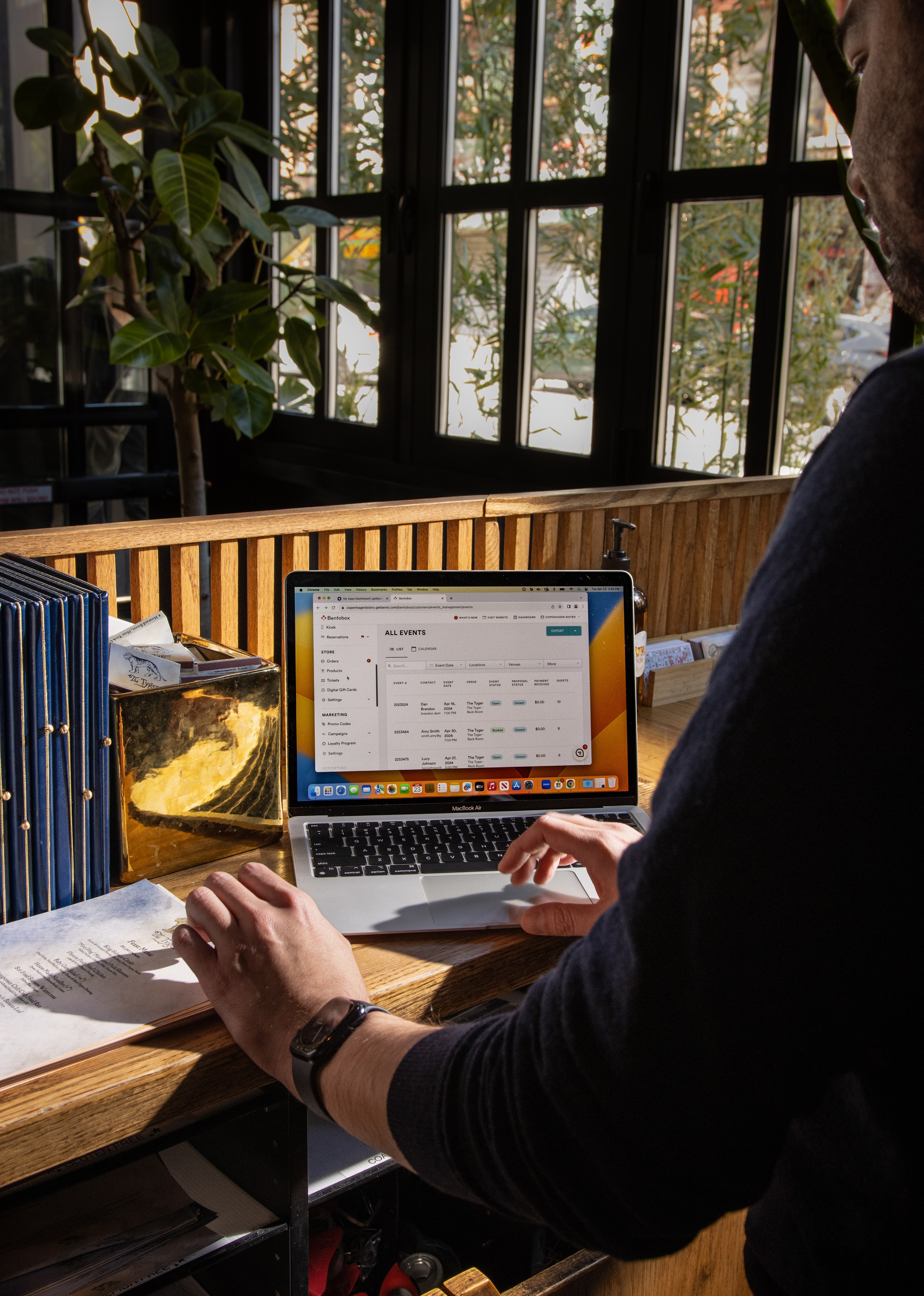Operations
Which Restaurant Reservation System Should You Use?
May 23, 2023
We compare BentoBox, OpenTable, Resy, SevenRooms, Tock, and Yelp.
There are so many options when it comes to choosing an online reservation system for your restaurant that it can start to feel a little overwhelming. That’s why we decided to compare and contrast a few of the major players, to help you make the most informed decision possible.
Whichever reservations system you end up using, BentoBox will seamlessly integrate it with your website. So go ahead, take a closer look at the most popular options and decide which one is the best restaurant reservation software for you.

PRODUCT
Need more efficient operations?
Streamline processes by integrating all your tools – from front of house to back of house and everything in between.
BentoBox Reservations
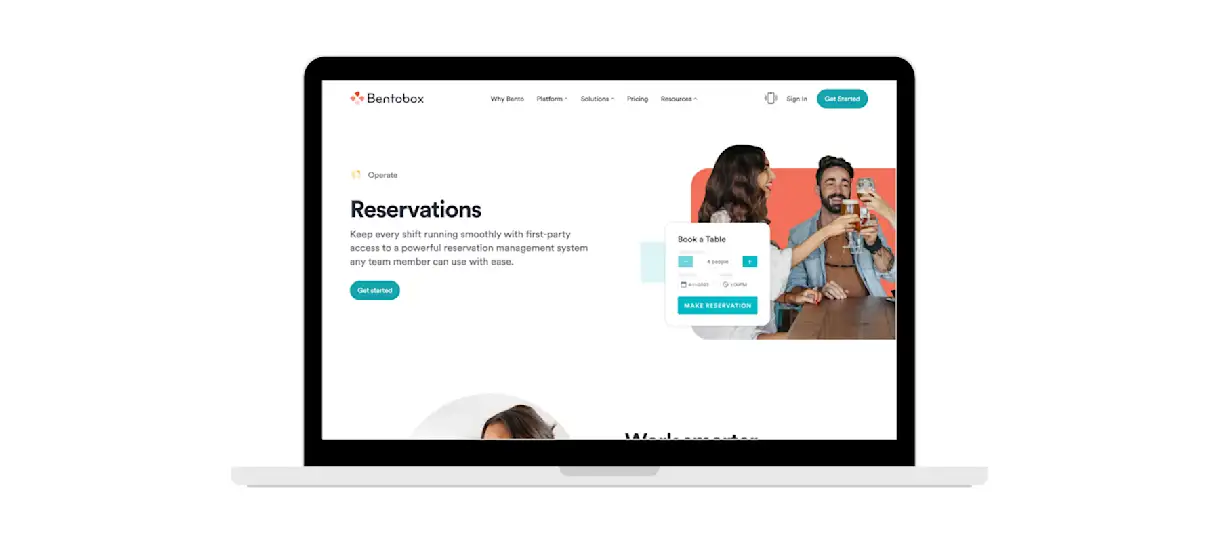
BentoBox Pros:
Table management and waitlist management features are built in, so you can control capacity and hold table inventory for walk-in guests through the same platform that you take reservations.
Two-way SMS communication with guests allows you to minimize no shows.
No cover fees. Your restaurant keeps all revenue on every reservation.
Reserve with Google integration enables you to capture more bookings through the powerful search engine.
You own your guest data and relationships, which means you can market to customers directly through communications that reflect your restaurant’s branding.
BentoBox Cons:
As a direct booking channel, there’s no guest network to tap into like there is on reservations marketplaces. However, with this model, you’re not paying a fee on every guest that books and you’re not competing with other restaurants for visibility on a third-party platform.
BentoBox Costs:
$199/month (per location) + $250 set-up fee
How BentoBox is Different:
If you have a loyal customer base that already books directly on your website, this is a great solution for you. It’s also a good option for restaurants who want their online ordering, pre-order and catering, website, events management, and reservations software under one roof for a more streamlined experience and unified guest database.
OpenTable
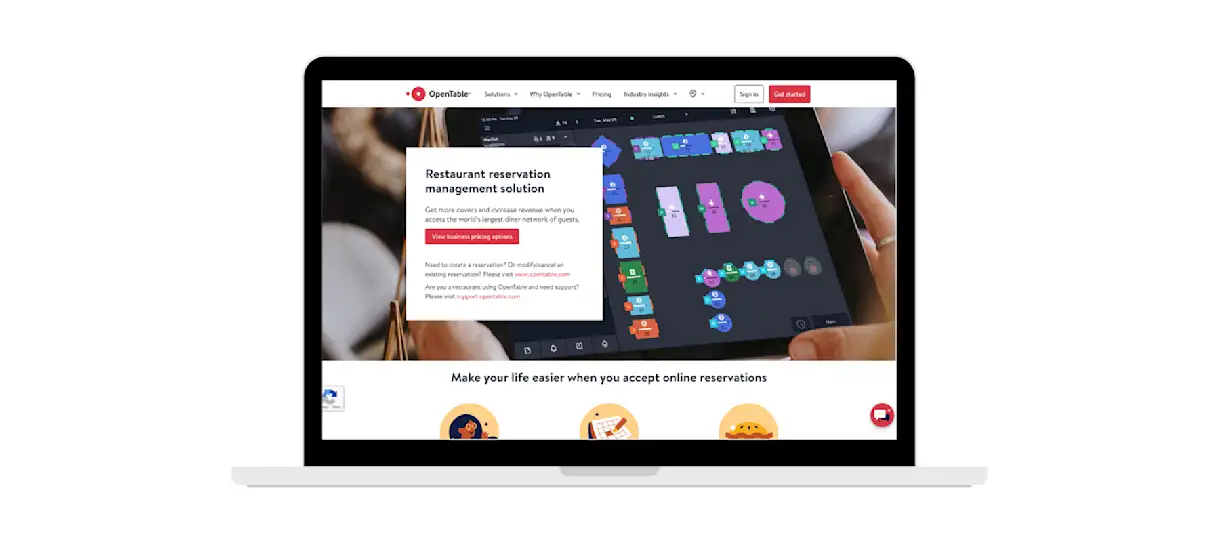
OpenTable Pros:
Major marketing engine with 31 million diners per month, significantly more than other platforms. Users are incentivized to go to OpenTable.com to search for a reservation.
Helps fill empty tables and generate steady business flow by recommending open tables to customers on the app.
Option for their simple-to-use Electronic Reservation Book, which handles reservation management, table management, guest recognition, and email marketing.
Dining points system to incentivize guests.
OpenTable Cons:
The dining points system builds loyalty for the OpenTable app rather than for your restaurant.
Offers the ability to sell gift cards, but links away from your website and comes with service fees. (An alternative is to sell gift cards straight from your website).
More than 50,000 restaurants on the app, meaning there's lots of competition.
Expensive and complex cost structure that includes cover fees.
Guest data is owned and controlled by OpenTable, not you.
OpenTable Costs:
Basic plan ($39/month + $1.50 per network cover after first 30 days + $0.25/cover OR $49/month flat free for reservations from your website + 2% service fee for takeout/experiences)
Core plan ($249/month + $1 per network cover + 2% service fee for takeout/experiences)
Pro plan ($449/month + $1 per network cover + 2% service fee for takeout/experiences)
How OpenTable is Different:
OpenTable is the biggest and original reservations marketplace, which could expose you to a wider audience. However, this exposure comes at a cost since restaurants pay a fee per network cover for accepting reservations. A reservations marketplace can be helpful for getting new customers, but it becomes less enticing when you’re still paying for guests who have dined with you before.
Resy
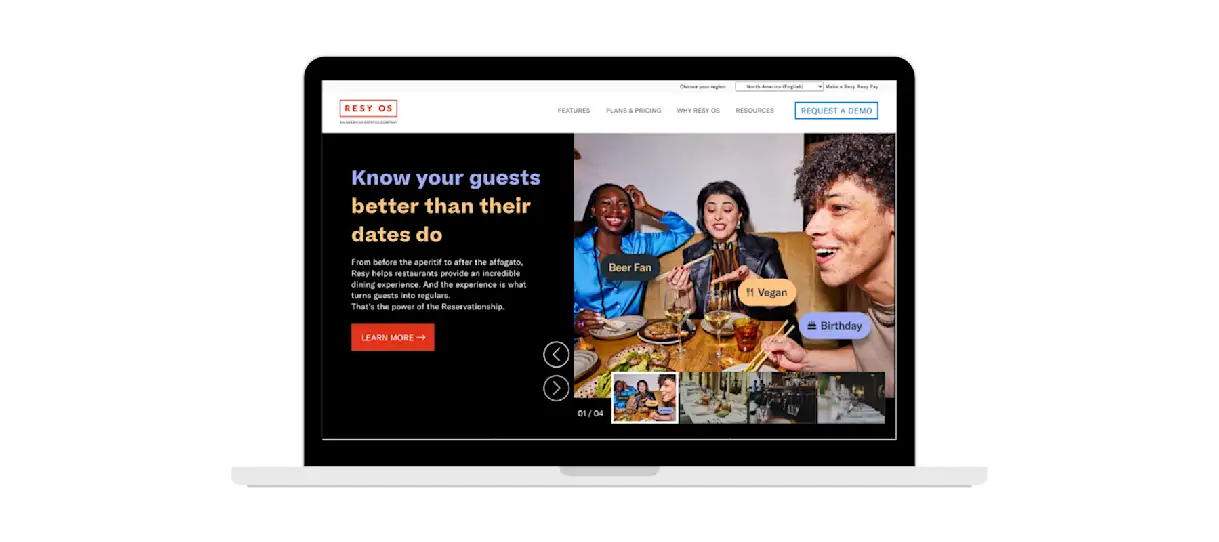
Resy Pros:
Ticketing and reservations on one platform.
Restaurants can mix and match their inventory in different ways to allocate tables by seating zone or prominence.
Two-way texting for reservations and waitlist.
Managers can track small-but-important events like wine ordering and table greetings.
Resy Cons:
Curates the restaurants it chooses to display, so users don’t see everything at the same time. Your restaurant might not get featured even if you’re using their software.
The discovery app for diners is only in major cities.
Customizable guest messaging, customizable post-meal guest survey, and POS Integration are not available in the Platform (basic plan), so those capabilities start to become costly.
You don’t own your guest data.
Resy Costs:
Platform (basic plan) - $249/month
Platform 360 (pro plan) - $399/month
Full-Stack (enterprise plan) - $899/month
How Resy is Different:
Resy is often seen as “the cool kid on the block” with great branding and popularity in large metropolitan areas. There are no network or cover fees associated with this reservations tool, but the flat rate is still on the higher end of options — especially if you want the full value of the platform with the Platform 360 plan.
SevenRooms
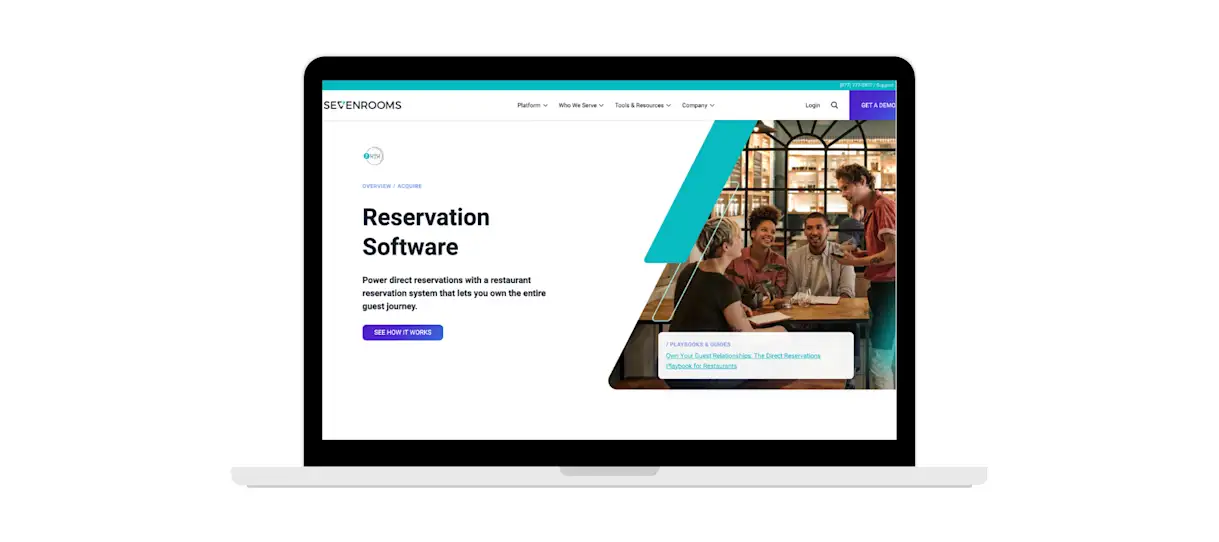
SevenRooms Pros:
Offers direct reservations with commission-free covers.
Reservations are synced to a robust CRM that can show you quick stats on a diner like number of visits, number of takeout orders, and total spend with the restaurant.
Integrates with 20+ POS systems.
SevenRooms Cons:
Doesn’t list pricing publicly.
The platform has extensive features that work well for larger establishments with more complex systems but can result in a steeper learning curve for single location restaurants.
SevenRooms Costs:
Not publicly available
How SevenRooms is Different:
SevenRooms is a popular pick among hotel food & beverage, big hospitality groups, and restaurants with multiple locations (especially internationally). Data ownership stays with the restaurant instead of the technology company, so it’s easy to see guest data across many properties.
Tock
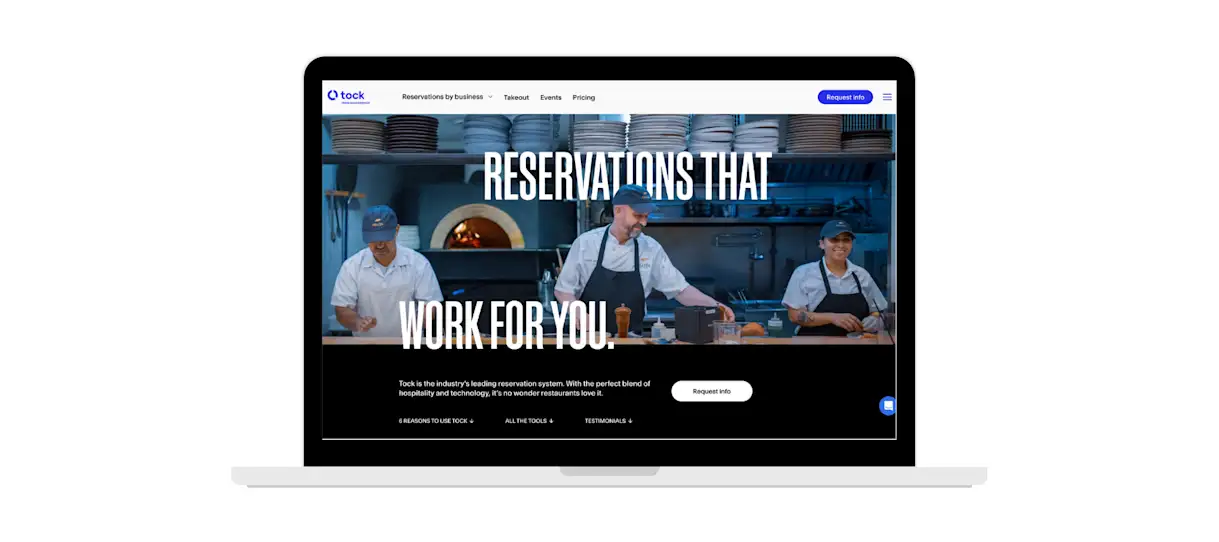
Tock Pros:
All-in-one solution for ordinary reservations, prepaid experiences, events, pickup, and delivery.
Everyday reservations displayed alongside unique experiences like chef’s counters, wine tastings or cooking classes.
Tools to engage with diners such as pre- and post-visit questionnaires, customizable two-way text messaging, and social media integrations.
Tock Cons:
Fees for add-on solutions beyond reservations like events and takeout can add up, costing between 2-3% per transaction.
Capacity management and shift management aren’t built in features.
Tock is a marketplace reservations system, like OpenTable, but their diner network isn’t nearly as large.
Tock Costs:
Plus plan ($249/month + 2% fee on prepaid reservations)
Pro plan ($749/month + no fee on prepaid reservations)
How Tock is Different:
Tock started with a forward-thinking reservation model: having restaurants take deposits upon booking. This was particularly geared toward fine dining or unique culinary experiences like tasting menus or chef’s dinners.
While the company still focuses on deposit-based and prepaid reservations, it has now expanded beyond that model to include reservations of all kinds plus takeout and events.
Yelp Guest Manager
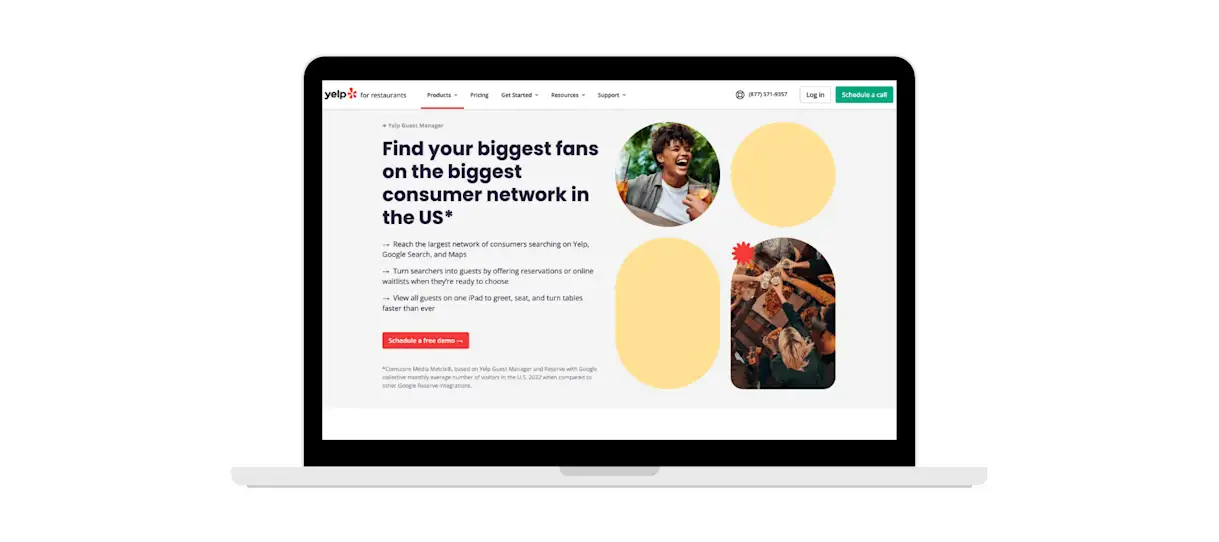
Yelp Guest Manager Pros:
Yelp has an audience of 80 million monthly diners. The platform offers a one-click booking for reservations and waitlist that’s integrated right on your Yelp profile.
The system gives live wait times and text message updates.
You can set credit card hold policies for weekends, holidays, or special events. Plus, you can customize when you charge for no shows or late cancellations.
Yelp Guest Manager Cons:
The Basic plan only covers up to 500 booked covers per month.
In order to get a customizable floor plan and POS integration, you’ll need the Plus plan.
There are only 8 POS integrations available with many of the most popular options not listed.
Yelp Guest Manager Costs:
Yelp Guest Manager Basic ($99/month)
Yelp Guest Manager Plus ($299/month)
How Yelp Reservations is Different:
Yelp is already a powerful restaurant review platform with a large reach, so it’s a natural fit for the company to offer a reservations tool that integrates into a restaurant’s Yelp profile. If you have a well-maintained and popular Yelp profile, this tool is a lightweight add-on. It’s important to make note that if you want to drive reservations from your website, you’ll be linked off site to the Yelp platform instead of staying on your restaurant’s website.

BentoBox Marketing & Commerce Platform
Deliver Smarter Hospitality
Want to stand out online, bring in more money, engage your diners, and streamline operations?
Recommended

Operations
What to Ask When Buying a Restaurant Reservation System
May 9, 2023
A reservation management system helps run smooth shifts and turn tables faster. Here’s what to ask before you buy.

Operations
How to Choose a Restaurant Table Management Software
February 9, 2023
The right solution will optimize traffic in your restaurant, fill more seats, and equip your team with the tools they need to manage seating effectively.

Operations
The Ultimate Guide to Restaurant Software
March 2, 2023
Supercharge your sales and operations with the right restaurant technology.
